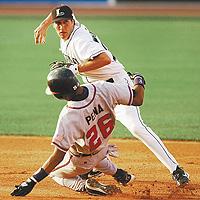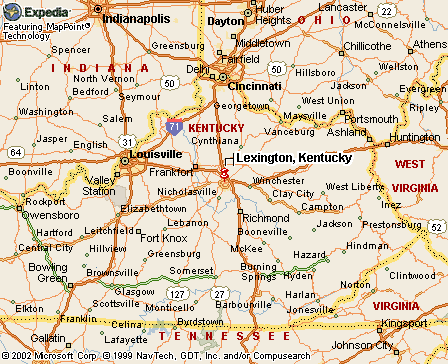|
|
Canku Ota |
|
|
(Many Paths) |
||
|
An Online Newsletter Celebrating Native America |
||
|
July 27, 2002 - Issue 66 |
||
|
|
||
|
Pride & Heritage |
||
|
by Mark Maloney Lexington
Herald-Leader
|
||
|
|
 For
a Native American, the name doesn't seem to fit. For
a Native American, the name doesn't seem to fit.
Whiteman. Turns out Tommy Whiteman's family name was shortened by his grandfather from Charges Plenty Whiteman. Tommy sticks to charging ground balls as a shortstop for the Lexington Legends. But Whiteman never strays far from his roots, which play an important role in his success as an athlete. "He really takes a lot of pride in (his heritage)," said Legends teammate Mickey McKee. "He uses that as kind of a source of inspiration for his baseball." During its annual powwow last August, the Crow Nation honored Whiteman as the first professional athlete from the tribe. "God blessed this boy," said Whiteman's father, Tom. "I always said, 'God touched you and said you're a baseball player.'" Big-league ability After his sophomore year, the Houston Astros came calling. The parent club of the Legends lured him away by making him their sixth-round pick in the 2000 draft. Tim Purpura, assistant general manager of the Astros, sees "big-league ability" in the 6-foot-3, 185-pounder. So does Legends Manager J.J. Cannon. "I don't think he's going to be in the minor leagues very long," Cannon said. "He's one of those kinds of guys." 'This boy is strange' "And from the time Tom was about in diapers, when he was just standing up, he had that little yellow bat and that little whiffle ball, and he'd be banging that ball," said his mother, Alicia. "It was kind of fun to watch him. ... It would have to be still when he hit it. Then, he got to where he could hit it on the move." Tommy's power increased and Alicia began to fear for her dishes, so the string and ball came down. That didn't end Tommy's passion for ball games, though. Especially the hitting part. "He'd be playing (with) cars -- with his pajamas that have feet in them -- or he'd be playing (with) trucks in front of the TV and he'd say, 'Daddy, just a second; I want to watch this guy hit,'" his father said. "He'd watch whoever was hitting in the major leagues, and then we'd go back to playing. Pretty soon the next guy came up and, 'Daddy, just a second; I want to watch this guy hit.' "And I thought, 'This boy is strange.' This kind of evolved, and he kept playing and playing." Young Tommy looked up to major-leaguers including Cin-cinnati's Barry Larkin and Baltimore's Cal Ripken Jr. He also looked up to his father. Tom played through high school but says he was "nothing spectacular." But he passed his knowledge along. And he still does. For three years, father and son have run an off-season hitting-instruction camp in Oklahoma City. Learning the old ways Tommy's given name is Owner of Outstanding Horses, although he doesn't own horses. In Crow tradition, he was named after someone his parents thought highly of; a cousin who had a knack for buying quality racehorses. Also in Crow tradition, Tommy and sisters Kristie, 27, and Jamie, 25, spent a lot of time with their Crow grandfather and Kiowa grandmother, parents of Tommy's father. "It's the Crow custom that the grandparents help raise the grandchildren so that they can teach them the old ways," said Alicia, who is part Cherokee. From their elementary through junior-high years, "Two of the three children would stay with my parents from Sunday to Sunday," Tom said. "And every Sunday, we would trade. We always said we had joint custody of our children. ... They rotated, so we saw a different child every week for all nine years." The grandparents lived in Oklahoma during the school year, and on the Crow Nation Reservation near Billings, Mont., each summer. Tommy would visit them at his grandfather's ranch in Montana every year. "We just ride horses. Do all kinds of things," Tommy said. "I'd go to powwows or just anything; just hanging out with other family members and just trying to learn the ways." That included learning how to war-dance -- an activity not entered into lightly, as the regalia is expensive. Some of his war-dance dress has been passed down through the years, including a piece from his great-grandfather. Get in Tommy's car (Oklahoma license plate "CROWBOY") and you are likely to hear war-dance music, Tommy's father says. Sharing his heritage Whiteman is soft-spoken. But he says he loves to tell teammates, or anyone else, about his heritage. Last August, the Astros and Legends granted Whiteman a weekend leave to Montana. Thousands attended the powwow at which Whiteman was honored. When he returned, he brought his war-dance video. "I saw the whole footage and it was amazing," Cannon said. "It's very special to see a man and his tradition, Native American, go out and perform their native dance and be honored. It warmed my heart to see that. It makes us all proud." Not all of Whiteman's teammates have seen him war-dance. But they did see a recent article in Baseball Weekly, including a color photo of Whiteman in full Crow dress. McKee admitted to an initial snicker, simply because the costume is so unusual. "But when you see that he's proud of it and that he takes an interest in his heritage, it makes you a little bit more interested in it, and it makes you kind of proud of him, too," said McKee, Whiteman's roommate when the players broke into pro ball three years ago at Auburn, N.Y., and who now has an adjoining locker. "I've got a tremendous amount of respect for Whitey anyways just because of what a good person he is and what a player he is." On the fast track A high school All-American. Leading hitter (.360) on Oklahoma's 2000 NCAA Tournament team. After breaking into pro ball later in 2000, Whiteman landed in Lexington last season. A post-season South Atlantic League All-Star, Whiteman led the league in slugging percentage (.566) and finished second in batting (.319). He had a 16-game hitting streak, twice was named SAL Player of the Week and earned a late-season promotion to Class AA Round Rock. He started this season at Round Rock, but was sent to Lexington on April 22. The demotion was due to a slow start -- .179 in 15 games -- but also because of a trickle-down effect among Houston shortstops. The Astros dropped Adam Everett to Class AAA New Orleans, bumped Eric Bruntlett from AAA to AA, and Whiteman from AA to A. "He's very interesting for a shortstop because of all the things he can do offensively," Purpura said. "He moves the ball around the field. He can hit with with some power. He hits the ball in the gaps. He can run. So he's got a lot of tools offensively, and when you pair that with his defensive ability ... "He's an above average defensive shortstop. Great range. Very smooth actions. ... Can throw from a variety of spots on the field." All those qualities, and what his father calls the ethic of "a worker bee," have shone through in Lexington. Whiteman was the Legends' Defensive Player of the Month in May, and Offensive Player of the Month in June. After struggling at the plate early, Whiteman warmed up in mid-May. His average rose from .184 on May 14 to .297 on June 10. He hit safely in 26 of 31 games, including 13 multi-hit games, until he pulled a hamstring June 20 while running out a bunt single. He has missed 22 games as of last night's 5-2 loss at Greensboro, but is due back any day. He is hitting .291 with five homers and 27 RBI. Overcoming failure In fact, Whiteman's struggles at Round Rock resulted in a positive at Lexington, rather than strapping on Mizuno catchers gear and switching positions, he persevered. "Failing is a big part of being able to play in the major leagues," Purpura said. "To me, what guys learn when they fail is the ways they then go forward and get out of slumps. How they correct themselves and get back on track with their stroke or how they're playing defense, that is the value of the minor leagues." Whiteman understands the importance of learning. He continues to work on his Crow language skills with his grandfather. And his credo on and off the field is simple. "No matter what background you're coming from, always do your best," he said. "And just try to show people who don't even know you or people who do know you, that you can be successful in anything you do."
|
|
|
||
|
|
||
| Canku Ota is a free Newsletter celebrating Native America, its traditions and accomplishments . We do not provide subscriber or visitor names to anyone. Some articles presented in Canku Ota may contain copyright material. We have received appropriate permissions for republishing any articles. Material appearing here is distributed without profit or monetary gain to those who have expressed an interest. This is in accordance with Title 17 U.S.C. section 107. | ||
|
Canku Ota is a copyright © 2000, 2001, 2002 of Vicki Lockard and Paul Barry. |
||
 |
 |
|
|
The "Canku Ota - A Newsletter Celebrating Native America" web site and its design is the |
||
|
Copyright © 1999, 2000, 2001, 2002 of Paul C. Barry. |
||
|
All Rights Reserved. |
||
